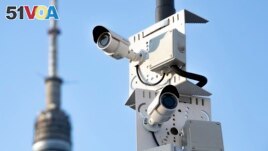30 May 2023
Human rights supporters say Russia under President Vladimir Putin is using online technology to follow, censor, and control the population.
Officials are introducing artificial intelligence (AI) systems to monitor social media for information that is not approved. They also are expanding a monitoring network with facial recognition cameras. Critics fear an expansion of online censorship and a loss of privacy rights in Russia.
Rising online censorship

FILE - Surveillance cameras sit on a utility pole in Moscow, Russia on February 22, 2020. (AP Photo, File)
Protests that were organized online from 2011 to 2012 caused Russian officials to increase internet controls.
Some laws permitted officials to block websites. Other laws required that cellphone operators and internet providers store call records and messages and share the information with security services if needed.
Officials pressured companies like Google, Apple, and Facebook to store user data on Russian servers, but it did not lead to change from those companies. Additionally, officials announced plans to cut off Russia's internet from the rest of the world.
After Russia invaded Ukraine in 2022, online censorship and legal action against individuals on social media increased a lot.
Net Freedoms is an internet rights group. It found that officials blocked or removed more than 610,000 websites in 2022. That is the highest yearly total in 15 years. In addition to that, 779 people faced criminal charges over comments made online.
Net Freedoms head Damir Gainutdinov said the government enacted a law one week after the invasion of Ukraine that effectively made antiwar expressions a crime. It outlaws "spreading false information" about or "discrediting" the army.
Human Rights Watch, a New York-based group, said there is another 2022 law permitting officials to close media businesses and block online materials if they spread "false information" or call for sanctions against Russia.
Online censorship systems
Internet rights supporters are concerned that online censorship is about to expand further. They say artificial intelligence (AI) systems are monitoring social media and websites for banned content.
In February, the agency that supervises the media, Roskomnadzor, said it was launching Oculus. Oculus is an AI system that looks for banned material in online photos and videos. It can look at more than 200,000 images a day, compared to 200 a day for humans. Two other AI systems are to search written material.
In February, the newspaper Vedomosti reported that an unidentified Roskomnadzor official said the new systems will be used to identify extremist comments, calls for protests and "LGBT propaganda."
A Belarusian hacker group called Cyberpartisans said it got documents from an agency that is part of Roskomnadzor. The group said officials could also be working on bots, a kind of software program that collect information from social media pages, messenger programs, and closed online communities.
Yuliana Shametavets of Cyberpartisans told the Associated Press the bots are expected to infiltrate Russian-language social media accounts to monitor and to spread propaganda.
She said, Russia is "great at disinformation campaigns and there are high-class IT experts who create extremely effective and very dangerous products."
"IT" is a short way of saying information technology.
Eyes on the streets
In 2017 and 2018, Moscow officials began placing around the city street cameras that use facial recognition technology to identify people.
During the COVID-19 pandemic, officials were able to follow and fine those who broke rules against going out in public.
When protests over the imprisonment of opposition leader Alexei Navalny started in 2021, officials used the system to find and arrest protesters, sometimes weeks later. The system was reportedly used to help officials find people avoiding the draft for military service after the invasion of Ukraine.
Sarkis Darbinyan is with Roskomsvoboda, a Russian internet freedom group.
He said, in Moscow, there are 250,000 cameras in the system. He said they are at entrances to buildings, public transportation, and on the streets. He added that similar systems are in St. Petersburg and other large cities, like Novosibirsk and Kazan.
Darbinyan said he believes officials want to build "a web of cameras around the entire country."
I'm Gregory Stachel.
Dasha Litvinova reported this story for The Associated Press. Gregory Stachel adapted it for VOA Learning English.
_
Words in This Story
censor – v. to examine books or movies in order to remove things considered harmful, offensive or immoral
sanctions –n. (pl.) punishments placed on a country to cause it to obey international law
monitor –v. to watch and follow something or somone
LGBT – acronym lesbian, gay, bisexual and transgender
hacker –n. a person who breaks into the computers to get information or cause damage
infiltrate – v. to secretly enter or join a group in order to get information or do harm
draft – n. a system in which young people are required to join the armed forces of a country for a period of service












